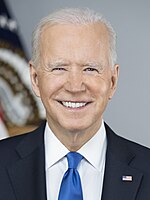
Back Élection présidentielle américaine de 2020 au Kansas French 2020년 미국 대통령 선거 캔자스주 Korean 2020 United States presidential election in Kansas SIMPLE
| ||||||||||||||||||||||||||
| Turnout | 65.9%[1] | |||||||||||||||||||||||||
|---|---|---|---|---|---|---|---|---|---|---|---|---|---|---|---|---|---|---|---|---|---|---|---|---|---|---|
| ||||||||||||||||||||||||||
| ||||||||||||||||||||||||||
| ||||||||||||||||||||||||||
| Elections in Kansas |
|---|
 |
The 2020 United States presidential election in Kansas was held on Tuesday, November 3, 2020, as part of the 2020 United States presidential election in which all 50 states plus the District of Columbia participated.[2] Kansas voters chose electors to represent them in the Electoral College via a popular vote, pitting the Republican Party's nominee, incumbent President Donald Trump of Florida, and running mate Vice President Mike Pence of Indiana against Democratic Party nominee, former Vice President Joe Biden of Delaware, and his running mate Senator Kamala Harris of California. Kansas has six electoral votes in the Electoral College.[3]
Although Trump won the state, Biden's 41.51 percent vote share represented the highest for a Democratic presidential nominee since Barack Obama's performance in 2008 and among the strongest swings to Biden, relative to Hillary Clinton's performance in 2016, in the nation. His 14.63-point defeat represented the first time since 1916, and only the second time ever, that Kansas voted more Democratic than neighboring Missouri, where his margin of defeat was 15.39 points.
Per exit polls by the Associated Press, Trump's strength in Kansas came from white voters, who supported Trump by 59%–38%; white voters with college degrees, however, were tied. This result included a 64% showing for Trump among Protestants and a 74% showing among other Christians. Trump's best margin was 72% in rural areas, while Biden's was 52% in suburban counties.[4]
- ^ "Voter turnout in United States elections". Ballotpedia. Retrieved February 28, 2023.
- ^ Kelly, Ben (August 13, 2018). "US elections key dates: When are the 2018 midterms and the 2020 presidential campaign?". The Independent. Retrieved January 3, 2019.
- ^ "Distribution of Electoral Votes". National Archives and Records Administration. Retrieved January 3, 2019.
- ^ "Kansas Voter Surveys: How Different Groups Voted". The New York Times. November 3, 2020. ISSN 0362-4331. Retrieved November 9, 2020.






